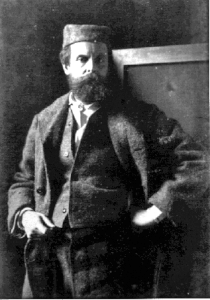Analysis of The Soul’s Mutiny
Wilfrid Scawen Blunt 1840 (Petworth House) – 1922 (United Kingdom)
I saw a galley passing to the West,
Its silken sails aglow as if with blood,
When the red sun dropped down into his nest,
And hurled his level spears across the flood.
And at its prow a mighty woman stood
With braided locks of blackest ebony,
While from the thick--fringed eyes her haughty mood
Flashed forth in all disdainful majesty.
For she was tall and vestured like a queen,
And from her shoulders in imperial fold
A stripèd tunic, wrought of black and green
With strange device of dragons manifold,
Fell to her waist and rippled o'er with gold,
Where caught up in a girdle loosely bound,
Then freely down in potent masses rolled
And clung about her feet and clasped the ground.
And ever and anon, with gracious smile
Lighting the royal sculpture of her face,
She gave commands. And each his joyful toil
Plied at her word, and with redoubled grace
Bent to his oar, and working still in place
Did all her bidding. And the ship moved on
As one which, wagered in a mighty race,
Sailed surely to the front and surely won.
And next I saw a slender child who seemed
Sprung from the river god's unearthly dew,
And in his face the light of wisdom gleamed
And round about in flashing circles flew.
And he arose and whispered to the few
Who sat beside him, and to each in turn
He told his counsel thus to all the crew
In honied words which I had wished to learn.
And at his voice each rower dropped his oar,
And the sail flapped unguided on the mast,
And discord rose, the while upon the shore
Drifted the galley down the current fast.
And she who stood upon the prow had cast
Her angry words upon the storm in vain,
Though her deep tones came pealing down the blast
As though the heavens should be rent in twain.
And then I marked her, when she first espied
The fair child which had made this harm to be.
There was great wonder mingled with her pride
That one so tenderly designed as he
Should dare dispute with her old mastery.
And yet nor anger nor proud looks might quell
The fearless eyes which smiled out mutiny,
Till her own heart seemed stricken with the spell,
With wonderment fast quickening to dismay,
And a dull rage which smouldered 'neath her brows.
And then rage, wonder, pride did fade away
Before the cruel thought which lastly rose
From out her mad heart with colossal throes,
A thought so heavy--black that I did guess
It came full freighted with the immortal woes
Of an old god dethroned and heavenless.
For, sudden, with a shout, her arms she threw
High o'er her head, a torch in either hand,
And round the ship the flames triumphant flew,
The shrivelling sails fell low, while still she fanned
With tempest voice the leaping fire which spanned
The sinking galley with an arch of flame.
I heard her thunder forth her last command
And bid the traitors perish in their shame.
The ship went down, and a sad cry arose,
Stifled with smoke and rushing waters in.
The silent stream, as heedless of men's woes,
Went on its way as they had never been.
The brave ship rots upon the ooze, I ween,
And naked limbs lie stark upon the shore,
Long ripples lap that angry--hearted queen
And wash those mutinous eyes for evermore.
| Scheme | ABABXCXC DEDEEFEF XGXGGXGX HIHIIJIJ KLKLLMLM ACXCCNCN OXOPPXPG IQIQQRQR PSPSCKDK |
|---|---|
| Poetic Form | |
| Metre | 1101010101 1101011111 1011110111 0111010101 0111010101 1101110100 1101110101 1101010100 111101101 01010001001 0111011101 110111010 11010101011 1110010101 1101010101 0101010101 010011101 1001010101 1101011101 1101010101 1111010101 1101000111 1111000101 1101010101 0111010111 1101010101 0011011101 0101010101 0101010101 1101101101 1111011101 011111111 0111110111 00111101 0101010101 1001010101 0111010111 0101010101 101111101 1101011101 011101111 0111111111 1111010101 1111000111 1101101100 0111011111 0101111100 1011110101 11001100101 001111101 0111011101 0101011101 1101110101 0111011111 1111100101 11110101 1101010111 11001010101 0101010101 011111111 11010101011 0101011111 1101010101 0101010011 0111001101 1011010100 010111111 1111111101 0111010111 0101110101 1101110101 0111001110 |
| Closest metre | Iambic pentameter |
| Characters | 3,067 |
| Words | 581 |
| Sentences | 20 |
| Stanzas | 9 |
| Stanza Lengths | 8, 8, 8, 8, 8, 8, 8, 8, 8 |
| Lines Amount | 72 |
| Letters per line (avg) | 34 |
| Words per line (avg) | 8 |
| Letters per stanza (avg) | 275 |
| Words per stanza (avg) | 64 |
Font size:
Submitted on May 13, 2011
Modified on March 05, 2023
- 2:55 min read
- 57 Views
Citation
Use the citation below to add this poem analysis to your bibliography:
Style:MLAChicagoAPA
"The Soul’s Mutiny" Poetry.com. STANDS4 LLC, 2024. Web. 1 May 2024. <https://www.poetry.com/poem-analysis/38942/the-soul%E2%80%99s-mutiny>.


Discuss this Wilfrid Scawen Blunt poem analysis with the community:
Report Comment
We're doing our best to make sure our content is useful, accurate and safe.
If by any chance you spot an inappropriate comment while navigating through our website please use this form to let us know, and we'll take care of it shortly.
Attachment
You need to be logged in to favorite.
Log In